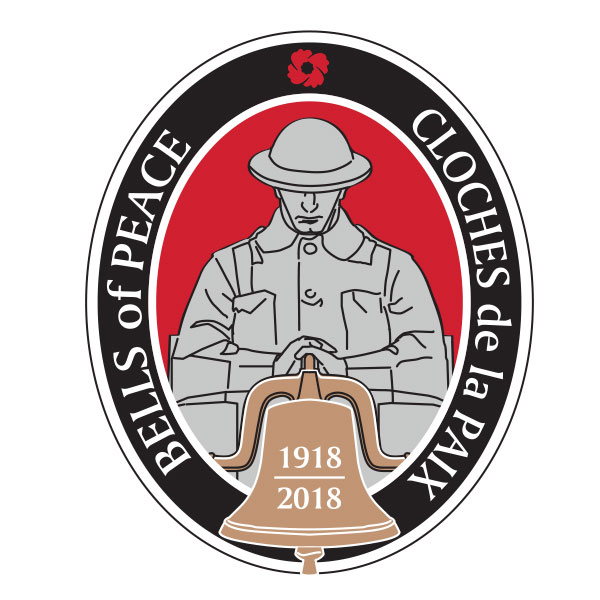
The Royal Canadian Legion is hoping to mark the centennial of the end of the First World War with the solemn sound of church bells ringing in communities throughout Canada on Nov. 11.
“The Dominion Executive Council wanted us to find a way to appropriately mark the centennial of the Armistice,” said Deputy Director of Corporate Services Danny Martin. “There were several suggestions made. We wanted to find something in which the entire Legion could participate.”
The program that was accepted is known as the Bells of Peace. The intention is to encourage communities to make their church bells toll 100 times at the setting of the sun on Remembrance Day. With seven different time zones in Canada, the ringing will be staggered as the sunset occurs, east to west.
“We invite communities to be as creative as they want to be,” said Martin. “The ringing of bells can be in sequence or in unison or it can be a cacophony.”
Branches will be encouraged to find descendants, preferably youth, of First World War veterans to do the ringing. Pipers will be encouraged to play “Amazing Grace” or another appropriate piece of music at the cessation.
The concept was modelled on the spontaneous ringing of church bells throughout England when the peace was announced. Similar spontaneous actions happened in Canada but it was not known to be nationwide at the time.
Specific historical sites have been identified in each Canadian province for the commemoration to happen. Selected sites include:
• St. John’s Harbour, where the Royal Newfoundland Regiment departed for the First World War.
• Halifax Harbour, where the Halifax Explosion devastated the city during the war.
• Charlottetown, where artillerymen from the 4th Regiment of the Canadian Garrison Artillery were among the first to sail for England.
• Fredericton, to remember Private John Henry Thomas of Birch Ridge, N.B., whose identity was recently confirmed for remains found in 2016 and buried with honours in August.
• Valcartier, Que., where the First Contingent of the Canadian Expeditionary Force trained before leaving for Europe.
• Guelph, Ont., which is the birthplace of poet, soldier, doctor John McCrae, the author of “In Flanders Fields.”
• Winnipeg, where one street now named Valour Road was home for three Victoria Cross recipients of the First World War.
• Saskatoon, to commemorate Alex Decoteau who was born on the Red Pheasant Reserve. He went on to be an Olympic track and field athlete and was Canada’s first aboriginal police officer. He was killed by a sniper during the Battle of Passchendaele.
• Jasper National Park in Alberta, where the five mountains in the Victoria Cross Ranges commemorate recipients of the Victoria Cross.
• Victoria, Fort Rodd Hill is a historic site and is where Arthur Currie, later Lieutenant-General Sir Arthur Currie, received his military training, which he would use to lead the Canadian Corps during the Hundred Days that ended the war.
There are many other significant people and events to be commemorated in Canada. Communities are encouraged to identify them and promote them through their own remembrance activities and social media.
The Bells of Peace program is supported by a grant from Veterans Affairs Canada through its Commemorative Partnership Program.
Other activities are planned to complement the Bells of Peace.
Dominion Carillonneur Andrea McCrady will play a program before the ringing of bells in the Peace Tower in Ottawa and is co-ordinating with other carillonneurs across Canada.
Leading up to Remembrance Day, organizers will be encouraging Canadian schoolchildren to search out the graves of those who served in the war and are buried in their community. Small Canadian flags will be made available for them to place on the veteran’s grave.
Participants will be encouraged to share their images and videos using the #100Bells hashtag or uploading to a campaign page on the Woobox social media platform or at www.legion.ca/remembrance/promoting-remembrance/bells-of-peace
“The body of Private Thomas was just buried this summer. The First World War continues to influence today. It’s still with us,” said Martin.
Advertisement



















